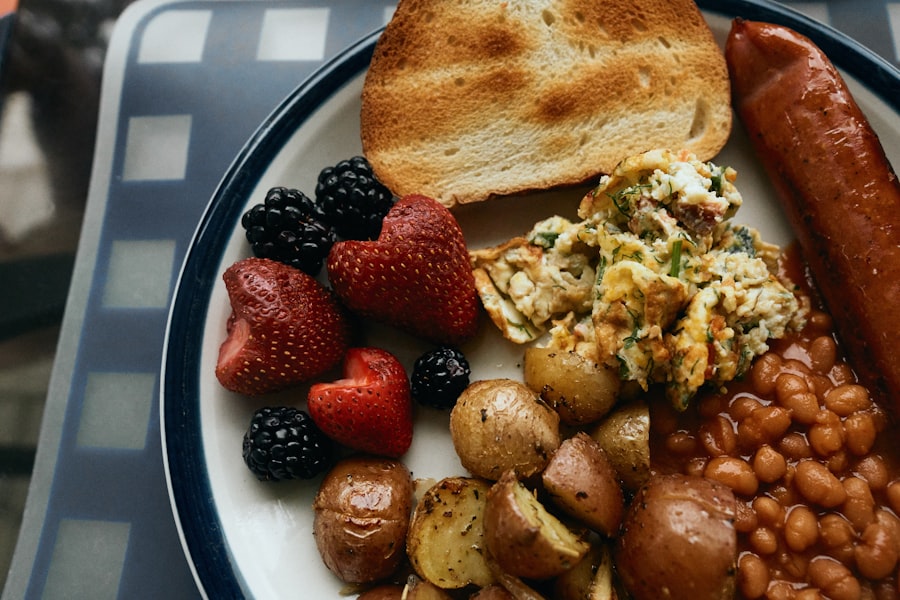As you step into the world of senior breakfasts, you quickly realize that this meal is more than just a simple gathering; it serves as a vital cornerstone for fostering community and promoting health among seniors. Breakfast is often touted as the most important meal of the day, and for seniors, this holds particularly true. It provides an opportunity to start the day with essential nutrients that can enhance energy levels, improve mood, and support overall well-being.
When you gather for breakfast, you are not just sharing food; you are sharing experiences, stories, and a sense of belonging that can significantly impact mental health. Moreover, a well-planned senior breakfast can serve as a platform for education and awareness about nutrition. It’s a chance to introduce healthier food options and encourage seniors to make better dietary choices.
By emphasizing the importance of breakfast, you can help instill lifelong habits that promote health and longevity. This meal can also be a social event that combats loneliness, which is a common issue among seniors. When you come together to enjoy breakfast, you create an environment where friendships can flourish, and support systems can be built.
Key Takeaways
- Senior breakfast is important for fostering community and celebrating the achievements of graduating students.
- Unhealthy habits such as skipping breakfast and consuming high-sugar foods should be identified and addressed.
- A healthier menu for senior breakfast should include nutritious options such as fruits, whole grains, and lean proteins.
- Nutritional education should be offered to seniors to help them make informed choices about their food and lifestyle.
- Physical activity should be implemented to promote overall health and wellness among seniors.
Identifying Unhealthy Habits
To create a successful senior breakfast program, it is crucial to first identify the unhealthy habits that may be prevalent among seniors. Many older adults may have developed dietary patterns that are not conducive to their health. For instance, you might notice that some seniors gravitate towards sugary cereals or pastries, which can lead to spikes in blood sugar levels and contribute to weight gain.
Recognizing these habits is the first step toward making meaningful changes. Additionally, it’s important to consider lifestyle factors beyond just food choices. Many seniors may lead sedentary lives due to mobility issues or lack of motivation.
This inactivity can exacerbate unhealthy eating habits and lead to a cycle of poor health. By understanding these patterns, you can tailor your breakfast program to address specific needs and challenges faced by seniors. This might involve offering alternatives to unhealthy foods and encouraging more active lifestyles through engaging discussions or activities during breakfast.
Creating a Healthier Menu

Once you have identified unhealthy habits, the next step is to create a healthier menu that caters to the nutritional needs of seniors. A balanced breakfast should include a variety of food groups, such as whole grains, lean proteins, fruits, and vegetables. You might consider incorporating oatmeal topped with fresh berries or scrambled eggs with spinach into the menu.
In addition to focusing on nutrition, it’s essential to consider dietary restrictions that many seniors may have. For example, some may be diabetic and require low-sugar options, while others may have allergies or intolerances that need to be accommodated.
You could also involve seniors in the menu planning process, allowing them to share their favorite healthy recipes or suggest new dishes they would like to try.
Offering Nutritional Education
| Metrics | Data |
|---|---|
| Number of educational sessions | 50 |
| Number of participants | 500 |
| Topics covered | Healthy eating, portion control, reading food labels |
| Feedback rating (out of 5) | 4.7 |
Education plays a pivotal role in promoting healthier eating habits among seniors. As you plan your senior breakfast program, consider incorporating short educational segments that focus on nutrition. You could invite a registered dietitian or nutritionist to speak about the importance of balanced meals and how certain foods can impact health conditions common in older adults, such as heart disease or diabetes.
In addition to guest speakers, you might create informative handouts or visual aids that highlight key nutritional information. These resources can serve as reminders for seniors about portion sizes, food groups, and the benefits of specific nutrients. By providing this education in an engaging manner, you empower seniors to make informed choices about their diets long after the breakfast event has concluded.
Implementing Physical Activity
While breakfast is an essential part of the morning routine, incorporating physical activity into your senior breakfast program can further enhance its benefits. Engaging in light exercise before or after breakfast can help stimulate appetite and improve digestion. You might consider organizing gentle stretching sessions or short walks around the venue before sitting down for the meal.
Physical activity doesn’t have to be strenuous; even simple movements can make a significant difference in overall health. Encouraging seniors to participate in activities that promote mobility and flexibility can lead to improved balance and reduced risk of falls. By integrating physical activity into your breakfast program, you create a holistic approach to health that addresses both nutrition and movement.
Encouraging Mindfulness and Stress Reduction

In today’s fast-paced world, stress can take a toll on anyone’s health, but it can be particularly detrimental for seniors. As you plan your senior breakfast program, consider incorporating mindfulness practices that promote relaxation and mental well-being. You might start each gathering with a few minutes of guided meditation or deep breathing exercises to help everyone center themselves before enjoying their meal.
Encouraging mindfulness during breakfast can also enhance the dining experience itself. Invite seniors to savor each bite and appreciate the flavors and textures of their food. This practice not only fosters a greater connection with their meals but also helps them develop healthier relationships with food overall.
By creating an atmosphere of calm and mindfulness, you contribute to reducing stress levels and promoting emotional well-being among participants.
Providing Supportive Resources
To ensure the success of your senior breakfast program, it’s essential to provide supportive resources that extend beyond the meal itself. Consider creating a resource table where seniors can access information about local health services, exercise programs, and nutritional workshops. This table could also include brochures on topics such as managing chronic conditions or tips for healthy aging.
Additionally, establishing a support network among participants can foster a sense of community and accountability. Encourage seniors to share their goals related to health and wellness with one another, creating an environment where they feel comfortable seeking advice and encouragement from peers. By providing these resources and fostering connections, you empower seniors to take charge of their health journeys.
Involving Students in the Planning Process
One innovative approach to enhancing your senior breakfast program is involving students in the planning process. Collaborating with local schools or universities can bring fresh ideas and energy into your initiative while fostering intergenerational connections. Students studying nutrition or health sciences could assist in menu planning or even lead educational segments during breakfast.
This partnership not only benefits seniors but also provides students with valuable hands-on experience in community service and health education. By working together, both groups can learn from one another and develop mutual respect and understanding. This collaboration creates a vibrant atmosphere at your senior breakfasts while enriching the lives of everyone involved.
Partnering with Local Health Organizations
To further enhance your senior breakfast program, consider partnering with local health organizations that share your commitment to promoting wellness among seniors. These organizations often have resources, expertise, and funding opportunities that can elevate your initiative. They may offer workshops on topics such as chronic disease management or provide access to health screenings during your events.
By collaborating with these organizations, you not only expand the reach of your program but also enhance its credibility within the community. This partnership can lead to increased participation from seniors who may feel more inclined to attend events backed by reputable health entities. Together, you can create a comprehensive approach to senior wellness that addresses both nutrition and overall health.
Promoting Long-term Health and Wellness
The ultimate goal of your senior breakfast program should be to promote long-term health and wellness among participants. This involves creating an environment where healthy habits are encouraged not just during breakfast but throughout daily life. Consider implementing follow-up activities or challenges that encourage seniors to continue making healthy choices after each gathering.
For instance, you might initiate a monthly walking club or cooking class focused on healthy recipes that participants can try at home. By providing ongoing support and opportunities for engagement, you help reinforce the lessons learned during breakfast and empower seniors to take ownership of their health journeys.
Celebrating the Revamped Senior Breakfast
As your senior breakfast program evolves into a vibrant community event focused on health and wellness, take time to celebrate its successes with participants. Organizing special themed breakfasts or recognition events can foster enthusiasm and encourage continued participation. You might host a “Healthy Recipe Showcase” where seniors share their favorite nutritious dishes or invite local chefs to demonstrate healthy cooking techniques.
Celebrating achievements not only boosts morale but also reinforces the importance of community involvement in promoting health among seniors. By recognizing individual progress and collective efforts, you create an atmosphere of positivity that encourages everyone to continue striving for better health outcomes together. In conclusion, revamping the senior breakfast experience is an opportunity for growth—both for individuals and the community as a whole.
By focusing on nutrition, education, physical activity, mindfulness, support resources, collaboration with students and local organizations, long-term wellness strategies, and celebration of achievements, you create a comprehensive program that truly enhances the lives of seniors. Through these efforts, you foster an environment where healthy habits flourish and connections deepen—ultimately leading to happier, healthier lives for all involved.
Improving breakfast habits for seniors is crucial for maintaining their overall health and well-being. A related article that provides valuable insights into this topic can be found on Explore Senior Health. This article discusses various strategies to enhance the nutritional quality of breakfast for seniors, ensuring they receive the essential nutrients needed for their age group. For more detailed information and practical tips, you can read the full article by visiting Explore Senior Health.
WATCH THIS!🧠 The Breakfast Mistake That Fuels Senior Memory Loss
FAQs
What are common senior breakfast habits that need fixing?
Some common senior breakfast habits that may need fixing include skipping breakfast, eating unhealthy or high-sugar breakfast foods, and not consuming enough protein or fiber in the morning.
Why is it important for seniors to have healthy breakfast habits?
Having healthy breakfast habits is important for seniors as it can provide essential nutrients, energy, and help maintain a healthy weight. A nutritious breakfast can also improve cognitive function and overall well-being.
What are some tips for fixing senior breakfast habits?
Some tips for fixing senior breakfast habits include planning and preparing balanced breakfasts, incorporating protein and fiber-rich foods, avoiding sugary cereals and pastries, and making time for breakfast each morning.
How can seniors incorporate more protein and fiber into their breakfasts?
Seniors can incorporate more protein and fiber into their breakfasts by including foods such as eggs, Greek yogurt, oatmeal, whole grain toast, and fresh fruits and vegetables. These foods can help seniors feel fuller for longer and provide sustained energy throughout the morning.
What are some healthy breakfast options for seniors?
Healthy breakfast options for seniors include oatmeal with nuts and fruit, whole grain toast with avocado and eggs, Greek yogurt with granola and berries, and smoothies with spinach, banana, and protein powder. These options provide a balance of nutrients and can help seniors start their day off right.
